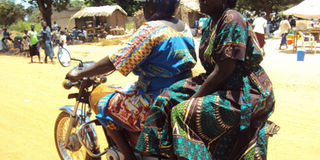Female boda boda cyclist rides route where few women dare

Female boda boda cyclist
What you need to know:
Determined. Ms Matilda Igama, a mother of seven, has been a boda boda cyclist in Adjumani for two years.
What others say
• Her daughter, Ms Patricia Kayodi, a student at Uganda Martyrs University, describes Ms Igama as a “hard working woman”.
“I love my mother, she has been supportive to all of us in the family and even outsiders,” Ms Kayodi says.
• Mr Dominic Mawadri, who operates from Awindiri stage, says: “She has solved personal and family problems of many people. She sometimes helps us with money for buying spare parts for our motorcycles.”
• Ms Dommy Ondoa, a district councillor, who has known Ms Igama for the past 10 years, says: “We have learnt a lot from her personality. She has given us spiritual guidance.”
It is unusual to spot a female boda boda rider in Madi Sub-region, which covers the two districts of Moyo and Adjumani. Passengers first hesitate and some stare in disbelief when Ms Matilda Igama calls out to them to sit on her motorbike.
Ms Igama has made history by taking a bold decision to take on the business of riding a motorcycle for commercial gain, making her the “first ever female boda-boda rider” in the sub-region.
She clocked two years in the business last month and is vowing to continue doing the same. She was previously dealing in retail business in Adjumani Town but decided to cross over to transporting passengers at a fee.
“It all started when I cleared my business loan and I was given one motorcycle as assert loan from Equity Bank Adjumani branch. And the condition attached to the asset loan was paying back Shs3 million,” she said.
After receiving the motorcycle, she hired a male rider and they agreed that he gives her Shs15,000 on a daily basis while she continues to operate a retail shop. “Through savings from the motorcycle and the money from my retail shop I returned to Equity Bank for another asset loan. I bought five motorcycles within a space of two years, making it six with the first one I had obtained as asset loan,” she says.
Ms Igama then employed six youths to operate her motorcycles on agreement that each of them would at the end of the day give her Shs10,000. But the plan failed this time.
Managing the six motorcycles turned to be a nightmare to her because some of the riders breached the agreement.
“In less than a year, they had disappointed me by deliberately refusing to honour the agreement. I registered cases at police almost daily and this brought a lot of hatred with my workers and their relatives forcing me to sell off the five motorcycles and I was left with only one,” she says.
Ms Igama decided to start riding her remaining motorcycle. The economic pressure had increased on her. She says losing the boda boda business would mean she would not be able to meet her loan obligation and cater for her family. “My aim is to pay the school fees of my seven children. Six of them are in secondary schools and one is in primary,” she says.
But what does it take to be the only female boda boda rider in the town? “I first feared competition from the experienced young male riders and this has prompted me to set up my own stage at Awindiri Trading Centre on Openzinzi Road. And surprisingly, men come a lot for me to take them home, offices and to gardens and schools,” she adds.
The stage where Ms Igama operates from has been named First Lady Boda Boda stage by residents. There are currently 15 riders at the stage, which is the first to be initiated by a female rider.
The 48-year-old rider makes about Shs70,000 daily and saves Shs30,000 daily. “I have 10 prominent customers who usually call me to transport them to various destinations every day. I also transport 10 nursery kids to and from school every school day at Shs30,000 per child per month,” Ms Igama says.
Apart from boda boda business, she is also an active member in three different village saving groups where members save money and the accumulated cash is shared amongst themselves at the end of the year.
“I first got married in Sudan with my first husband with whom I have six children but we separated and I have also parted ways with the second husband with whom I had my last born seven years ago,” she says.
“My daily work starts at 6:30am and ends at 6:00pm from Monday to Saturday and I rest on Sundays.” “I treat male customers differently because sometimes they can do ‘strange things’ on you. And sometimes the male ones deliberately refuse to pay money. They instead ask for love affairs after making a stopover,” Ms Igama says.
She adds that much as she has become an experienced boda-boda rider, some customers still doubt her capability because others brand female riders as learners who want quick money.
“There is no specific work meant for women in this competitive world. It is not the money from your husband that can make you happy but initiate your own project and be very principled and you will succeed,” he says.




